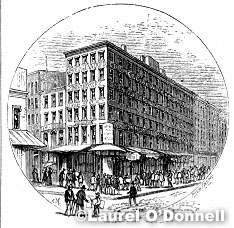|
|
The Metropolitan Newspaper, continued
advancement; in fact, the successful reporter must not only have a quick apprehension for what is news, hut he must also he able to find subjects for treatment without any suggestions or assistance of any kind from the editors.
The perfection of discipline maintained in the City Department would greatly surprise the people who imagine that a great newspaper puts itself together, and that the editor's most onerous duty is the filling of space. The precision with which nearly every thing is done would be creditable to the cadets at West Point. Each man as he receives his assignment draws a line under his name to indicate the fact; failures to obtain news which other papers contain is punished by suspension from duty or dismissal; faulty English or delay in supplying "copy" elicits a savage reprimand from the city editor, and unless a man is heroically attentive to duty the various penalties will break him. While the assistant city editor is required to keep track of all details, the city editor himself is wide-awake on all points. But his remarkable ability is best seen when occasion arises for a "spread." Thirty or forty men are then dispatched to various points, selected with an immediate perception of their value and strength. The affair is as momentous as a battle, and woe betide the man who is found wanting! An ocean passenger steamer is wrecked on the Jersey coast, and the earliest intelligence reaches the city at about noon — we imagine this for the sake of the example. The first thing to be done is to get several men to the scene of the disaster, and if no regular line of travel is open, special conveyances are chartered regardless of cost. Time passengers saved, the captain, time pilot, the men of the life-saving station from which the wreck was discovered, time agent of the steamer, the officers of other vessels in port, and every one who can throw some light on the disaster must he seen and interviewed. Most of these people are so fraught with their own troubles that they will not readily yield answers to the reporters' interrogations, and the latter only succeed in extorting statements from them by a degree of quiet persistence that would be deemed highly creditable in any other cause.
We have imagined that a brief telegram announces the wreck in the city about noon. Two hours later the scribes are on the spot, having reached it by a private steamer or a special train. The day is raw, misty, and miserable, and the great vessel looms through the ghostly atmosphere — a blot of darkness — with the surf beating over her and breaking on the low, sandy beach. There is plenty of activity and excitement; the life-saving station and the neighboring cottages of fishermen are filled with women passengers, who have been brought through the surf; the life-saving car is passing from the vessel to the shore with living freight, and the reporters elicit what information they can as they assist the surfmen and wreckers in the work of succor. Rain, mist, and spray are of no consequence to the newsgatherers; the day may be bitterly cold and wet, and they may have come from the city in light and insufficient clothing; their fingers may be almost frozen; hut the notebook and pencil are in constant use, and the moisture drops over their writing in troublesome pools as they beseech and besiege the surfmen in dripping tarpaulins, who have landed from the wreck. Then |
||
|
Page 8
Books & articles appearing here are modified adaptations
from a private collection of vintage books & magazines. Reproduction of these pages is prohibited without written permission. © Laurel O'Donnell, 1996-2006.
|
|||



